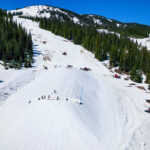While it certainly helps to be blessed with exceptional athletes and a deep pool of rising talent, ensuring the team is poised and ready to dominate at a major event goes far beyond the athletes. The Austrians have a well-deserved reputation for meticulous preparation and well-funded programs. They understand that ski racing is a tactical sport and develop their strategies to optimize performance.
“The Austrian Ski Team program is driven,” says Max Gartner, newly named head of Alpine Canada’s “Own The Podium” project. “They have the best minds planning how to prepare and use their resources wisely. Everything from athlete development to Olympic staging is planned and funded in a relentless drive to win.”
Being a powerful ski nation does not mean total domination. “While Austria is the number-one ski racing nation, it still is challenged competing against smaller, more nimble programs,” says Werner Margreiter, former head coach of the Austrian men’s team, now heading up the German men’s program. “It’s tough for a big team to bring the focus on individualized programs. This is where a smaller team can still compete very effectively.”
If Canada expects to take on the best and compete in our home Games, we should observe and learn. This was the clear evaluation of the Canadian Sport Review Panel—the joint evaluation of Canada’s team to the 2006 Games by Sport Canada, the Canadian Olympic Committee and “Own The Podium” experts. In their post-Torino evaluation of Alpine Canada (ACA), they wrote: “Canada’s elite program is comparable to other top countries—it is the strength of the Austrian development system that separates them from the other countries. Canada needs to better align provincial programming…and it would be helpful if federal/provincial/territorial could reinforce the need for integrated athlete development.”
It’s a pretty simple equation: take the Austrian program, compare what we do and don’t do, and get going to put what is missing in place. Otherwise we will be doomed to forever drift behind, hoping for the occasional remarkable talent or convergence of fate.
Since 2003, when Mark Sharp moved from head coach of the Women’s World Cup Team to become ACA’s national technical director, he has been developing strategies to build a system that will give Canadian talent the human, technical and fi nancial resources to succeed. Programs have been modernized or upgraded, and new projects introduced.
With the launch of Camp Green at Farnham Glacier in southeastern B.C. last summer, the inventory of tools available to our athletes has put Canada into the big leagues. We are no longer the only major ski racing nation without a proper off-season snow training venue.
Sharp’s staff has also been expanded, with the addition of Benoit Lalande, eastern technical director, and Richard Lepage, director of coaching education and development, as a joint project between ACA and the Canadian Ski Coaches Federation. This trio of development leaders will move the Canadian athlete development stream forward through the Husky Snow Stars (ages 6 to 12), Devonian Properties Rising Stars (11 to 16) and, for the first time ever, co-ordination of Provincial Team training (16 to 22).
Since the crucial link of performance is the coach, ensuring that the wealth of information and experience that currently resides within the coaching staff of the Canadian Alpine Ski Team is transferred and shared throughout the Canadian system is a priority for this group. Progress to move this task forward began with the fi rst-ever system-wide Canadian Coaches Summit held last spring. Professional coaches will now have leadership opportunities at the various ACA camps.
For the first time, we have a national framework or rudder to the Canadian athlete development stream. From the youngest age right to the Canadian Alpine Ski Team, projects inject program enhancements into the existing system. We’re learning who our talented athletes are at every level, how to guide them and how they can lead other young athletes to deepen our pool of talent.
It took the Austrian Ski Team 10 years to recover from the disastrous 1980s, hitting its lowest ebb with one medal in the 1984 Olympics and three medals in the 1987 World Championships, where Switzerland won 14. Today, it hardly seems possible that such a powerful team was so humbled less than 20 years ago. But Austria identified its problems, understood that nurturing talent takes patience, focused on the task and committed resources.
Canada is only beginning to see similar benefits of change. Last winter saw a bestever performance by the Canadian team: 12 podiums and the most World Cup points scored in the history of the tour.



